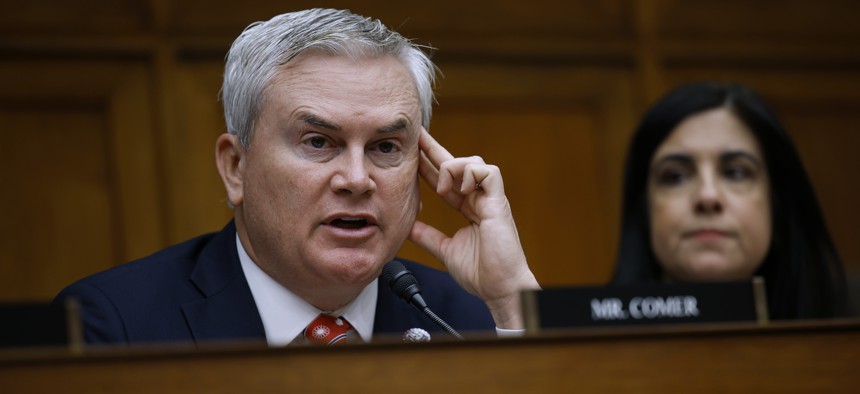Congress Looks to Undo Another D.C. Law

Rep. James Comer, chairman of the Oversight Committee of Kentucky. Chip Somodevilla/ Getty Images
The police reforms under scrutiny this time deal with hiring and the release of body camera footage, among other things.
Dozens of Washington D.C., residents showed up at a House hearing on Wednesday to protest moves by Congress to override the decisions made by their city council. Some wore t-shirts ordering members to keep their “Hands Off D.C.”
However, that did not sway Kentucky Rep. James Comer, the chairman of the Oversight Committee, who reiterated that Republicans in Congress intend to scrutinize the “progressive politics” of the city’s government.
“That’s not going to fly,” he said in reference to Congress keeping its hands off the nation’s capital.
Less than three weeks after a bipartisan majority in the Senate joined the House in voting to overturn changes the city made to its criminal code, Republican lawmakers questioned two members of Washington, D.C’s City Council, including its chairman, Phil Mendelson, and the city’s chief financial officer over a host of policies such as adding more bike lanes.
In a 21-17 vote that split along partisan lines, Republicans moved to overturn a second city law. They argued that the changes, which are opposed by the city’s police union, are driving up crime.
Under Congress’ unique authority over the nation’s capital, the committee sent to the full House a measure overturning a law the city council passed last December, making permanent emergency police reforms it enacted in the wake of George Floyd’s killing in 2020.
The reforms banned the hiring of officers with a history of serious misconduct, required the swift release of the names and body-camera footage of officers who use force on civilians, and barred the city’s police union from negotiating discipline against officers.
Republican Georgia Rep. Andrew Clyde, who sponsored the disapproval resolution, and the head of the police union argued that the reforms have driven away more than 1,000 of the city’s police officers since 2020.
“In reality, this is a back door to defund the police,” Clyde said. “What you do is you reduce their morale and you make them quit.”
Asked by Clyde if the reduction in officers would worsen crime, the union’s chairman, Greggory Pemberton, said it would be an “absolutely catastrophic situation.”
Mendelson noted that cities across the country are having a difficult time recruiting and retaining police officers.
Comer also criticized the reforms. “The council has continued to overlook its law enforcement officers in favor of progressive soft-on-crime policies that only benefit criminals,” he said. “If the D.C. Council wants to continue down this path, they will have to answer to this Congress.”
Rep. Virginia Fox, a North Carolina Republican, also raised the city’s 2015 Vision Zero Initiative to reduce traffic fatalities, asking Pemberton if new bike lanes and medians slowed police response. He responded that it does because “it is much more difficult for emergency vehicles to get through those areas.”
Democrats raised concerns about the committee's willingness to act to undo a city's policies.
“I don't even understand why we're having this hearing," said Rep. Gerald Connolly, a Democrat and former chairman of the Fairfax County Board of Supervisors in Northern Virginia. "We can have hearings until the cows come home about [the policies in] various municipalities or rural parts of America, in which we all disagree, or some of us disagree.”
“I didn't realize that I would be running for Congress to actually come back to a city council,” said Rep. Robert Garcia, a Democrat and the former mayor of Long Beach, California. “When I was mayor, if I had another body or Washington, D.C., coming at the laws that we pass, I certainly would be pretty upset."
Rep. Timothy Burchett, a Tennessee Republican, and former mayor of Knox County in the state, responded that the Constitution grants Congress power over the nation’s capital.
“We do have a right to intervene when they're sitting up there saying they don't have a crime problem in Washington,” he said.
Kery Murakami is a senior reporter for Route Fifty.
NEXT STORY: As 988 Crisis Line Sees More Use, States Debate How to Pay for It






